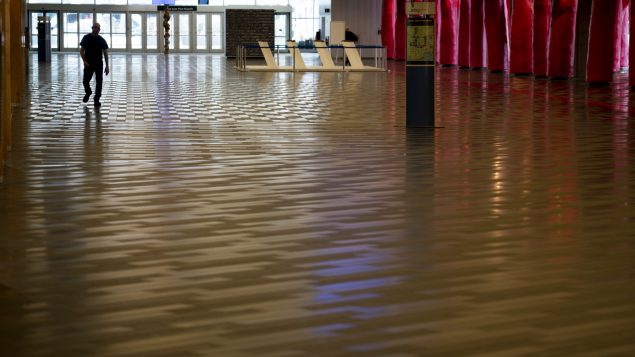The federal government is providing $600 million in new funding to help small and medium-sized businesses deal with possible lockdowns amid a second wave of the COVID-19 pandemic.
Prime Minister Justin Trudeau and Minister of Economic Development and Official Languages Minister Melanie Joly made announcement today in Ottawa, saying the money would be directed toward various sectors, including tourism, manufacturing and technology.

Chairs and bar stool are stored at a pizza restaurant in Montreal on Wednesday. Bars, restaurant and dining rooms in red zones in Quebec are closed until Oct. 28 because of government measures to fight COVID-19. The Canadian Federation of Independent Business estimates that 160,000 small or midium-sized businesses in Canada–about 14 per cent–are at risk of closing for good because of the pandemic. (THE CANADIAN PRESS/Paul Chiasson)
It will be added to $962 million already invested in the Regional Relief and Recovery Fund.
About $456 million of the new money will be made available to help businesses struggling to bridge their finances through another lockdown and will be distributed through regional development agencies.

A moose in an RCMP uniform wearing a mask and a cartoon cardboard cutout of Prime Minister Justin Trudeau greet customers at a store selling souvenirs in the Byward Market in Ottawa on July 12 in the midst of the COVID-19 pandemic. Large and small, businesses that rely on tourism have been hit hard by the virus. (THE CANADIAN PRESS/Justin Tang)
Another $144 million will help provide capital and technical support to rural businesses and communities through the offices of Community Futures Canada, which provides small business services to rural communities.
The CBC’s Louise Blouin reports that the Canadian Federation of Independent Business estimates that 160,000 small and medium-sized businesses in Canada–about 14 per cent–are at risk of closing for good due to COVID-19.

People attempt to physical distance themselves from one another as they walk along the seawall in Vancouver on March 31. British Columbia’s tourism and hospitality sector will be likely be getting some help from new funding announced today by Prime Minister Justin Trudeau. (THE CANADIAN PRESS/Jonathan Hayward)
The tourism, hotel and catering sectors are particularly threatened.
In a televised address to the country following last week’s speech from the throne, Trudeau warned that COVID-19’s second wave had already begun, warning that “Canada is at a crossroads.”
On Thursday, he announced plans to spend nearly $10 billion over three years in infrastructure initiatives that it hopes will help create some of the million jobs it promised in last week’s throne speech.
IWith files from CBC News (Louis Blouin), RCI







For reasons beyond our control, and for an undetermined period of time, our comment section is now closed. However, our social networks remain open to your contributions.